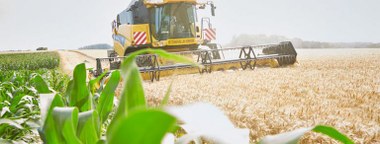ForwardFarming has expanded globally
(07-12-2021) Bayer ForwardFarming started as a Belgian project but has grown to a global phenomenon with 26 branches around the world.
What once started as a Belgian project has now expanded all over the world. Five years ago Hof Ten Bosch in Huldenberg was the first ForwardFarm, the Bayer network of test farms now has 26 branches around the world. Last year alone, six new farms were added. Carbon farming and reducing the climate impact of agriculture are currently the two main lines of research.
Five years ago, Bayer started building its global ForwardFarming network of farms where sustainable agricultural techniques and products are tested in real-life conditions. The network now has branches in Germany, the Netherlands, France, Italy, the United States, Brazil, Argentina and Chile.
The foundations of the concept were laid in Belgium. In Huldenberg, near Brussels, the chemical giant entered into a partnership with the Peeters brothers' farm Hof ten Bosch, where potatoes, among other crops, are grown. The ForwardFarm has meanwhile been visited by 10,000 people, including fellow farmers and crop advisers, but also researchers, policymakers, customers and other interested parties.
Farmers at the helm
Belgian sustainability manager Marc Sneyders of Bayer took the initiative for the ForwardFarm project five years ago. "When we started, I had no idea there would be so much interest in what we do," he says. According to Bayer, the interest is still on the rise. The company emphasises that the business owner remains at the helm in the cooperation. "The ForwardFarms are therefore not Bayer's pilot farms," he says.
Within Bayer's project, the 'Bayer ForwardFarming' Chair was also established in 2016. A team from Ghent University is carrying out trials on precision agriculture and biodiversity at the Hof ten Bosch in this context.
With the network of companies, the chemical giant wants to make clear that productivity and sustainability are not contradictory. "The network is built on local partnerships and serves as a tool to show that you can simultaneously increase productivity and reduce the ecological footprint."
According to Bayer, the initiative is important both for agriculture itself and for citizens. "It is a fact that society and agriculture have grown apart," Sneyders continues. "Within agriculture itself, there is a debate about what is or can be sustainable and what is not. As a company, you can say that high productivity and sustainability can go hand in hand. But if you can demonstrate it, that's something even more powerful." On the farms in the network, a two-track policy is applied. "We are not only looking at using crop protection as effectively and economically as possible, but also at robust crops - so breeding, farming techniques and digital tools that map out plots," Sneyders says.
"As a company, you can say that high productivity and sustainability can go hand in hand. But if you can demonstrate it, that's something even more powerful." - Marc Sneyders - Sustainability manager at Bayer
Fewer crop protection agents, higher yields
In its five years of existence, the network has already demonstrated the necessary research results. The use of GPS-controlled spraying and planting machines at Hof ten Bosch led to a 4% reduction in the use of crop protection agents and fertilisers. In potato cultivation, buffer strips and micro-dams were installed between ridges. This reduced soil erosion and the run-off of fertilisers and crop protection agents into the surface water by more than 90 percent. Better water distribution also increased the yield by 3%.
The Belgian example was quickly picked up by Bayer's global organisation. Meanwhile, the ForwardFarming network of 26 farms is spread across 13 countries and three continents. Some 35,000 visitors found their way to ForwardFarming farms. When the Covid-19 pandemic came, ForwardFarming went digital with virtual tours and online events. The network also expanded during the corona year: In 2021 six new companies were added to the network. For the first time a greenhouse horticultural company, has been added.
Carbon farming and reduced climate impact of agriculture
Bayer indicates that it intends to further expand the network in the coming years. Further expansion of the network in Belgium is not part of the plan. However, according to a spokesperson, the expansion of research at Hof Ten Bosch in Huldenberg is being considered. Carbon farming and reducing the climate impact are the two most important lines of research at the moment. Among other things, the multinational wants to investigate whether carbon farming can be an income model for European farmers.
Original reporting
Translation
Bayer endowed chair ForwardFarming

